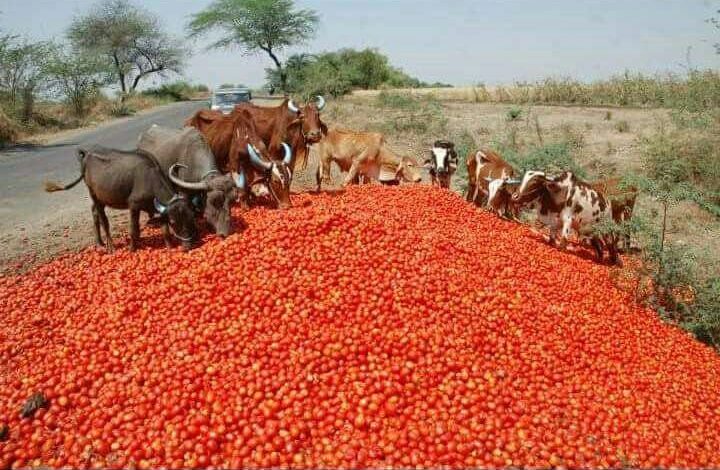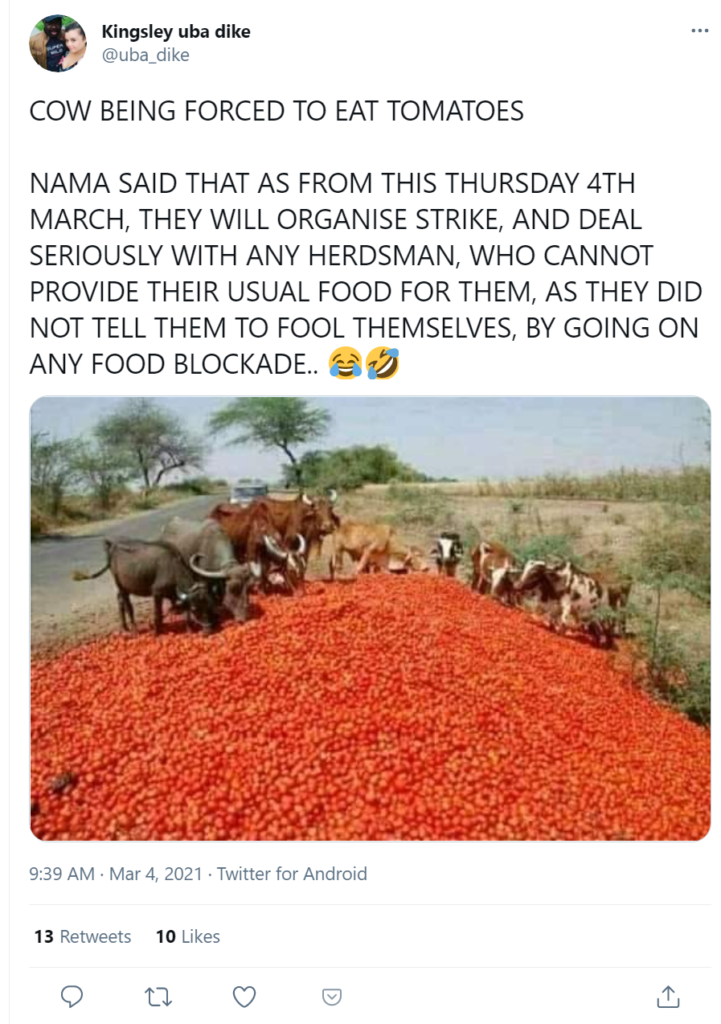Factcheck: Cows Eating Tomatoes? Picture Taken In India, Not Nigeria
The pictures are from 2013 and do not reflect the state of things in Nigeria.

A picture going viral on social media platforms in Nigeria, which has been claimed to show herders’ cattle in the country gobbling up a heap of tomatoes, was actually taken in India.
It was shared on Thursday on WhatsApp with the caption: “Nigerian cattle are the luckiest in the world! Most pampered. Chopping tomatoes… Issorait [it is alright]… Kwantinu [continue]!” It also appeared on Nairaland, Nigeria’s largest online forum with over 2.6 million members, with a similar import.
In a blogpost published on the same day, it was suggested that the tomatoes belonged to traders in Northern Nigeria who had embarked on a strike but could not preserve their products.
“Here are photo of spoil tomatoes throw away [sic.] along the road after been intercepted for days without able to move to the south,” the post claimed, further speculating that the tomatoes may be up to a million.
The claim has spread to the microblogging platform Twitter as well.
“Cow being forced to eat tomatoes,” Kingsley Uba Dike (@uba_dike) tweeted on Thursday in all caps. “NAMA said that as from this Thursday 4th March, they will organise strike, and deal seriously with any herdsman, who cannot provide their usual food for them, as they did not tell them to fool themselves, by going ono any food blockade.”
The Amalgamated Union of Foodstuff and Cattle Dealers of Nigeria (AUFCDN) had declared a food blockade on Thursday, Feb. 25, in protest against the compensation of its members for lives and properties lost to the violence following anti-police brutality demonstrations last year and ethnic clashes at Shasha Market in Oyo State, Southwest Nigeria. The association prevented its members from transporting food and livestock to the southern region until it called off the action a week later after meeting with Kogi State Governor, Yahaya Bello.
Using Google reverse image search, HumAngle traced the picture in circulation, which is linked to the food blockade, to an eight-year-old article on Bhopal Samachar, a Hindu newspaper.
The report published on April 12, 2013, was about a protest by tomato farmers in India who threw their crops on the road.
“A campaign to make agriculture a profitable business is going on in Madhya Pradesh, but tomato farming is proving to be the biggest loss-making business to the farmers of Barwani. The situation is that farmers are not even getting the cost price of tomatoes. They eventually threw tomatoes on the streets,” says the Google English translation of the article.
“In Barwani district, tomato production has been good in the district but due to not getting the price, farmers are now in a mood to store them and spend more. In this context, the farmers looked to the administration and leaders with hopeful eyes, but there was no help from there either.”
“Finally, farmers have thrown their crops on the roads so that at least the paint of the animals can be filled.”
The picture has since been dominantly used in conversations about the welfare of farmers in India. In this archived tweet posted in Marathi, a language spoken in India, on Jan. 16, 2018, the author attached the photo and wrote: “In which country … Government intervenes if vegetables are expensive! And when it gets cheaper, it leaves farmers in the lurch! #Import is open and #Export is charged! The #farmers there cannot be happy, and the country can never prosper!”
In a more recent tweet from Jan. 10, the picture of the tomato-eating cows was shared alongside the hashtag #StopImportTomatoAndOnion, an ongoing campaign in India to stop the government from importing the listed items and rather support local farmers producing them.
Support Our Journalism
There are millions of ordinary people affected by conflict in Africa whose stories are missing in the mainstream media. HumAngle is determined to tell those challenging and under-reported stories, hoping that the people impacted by these conflicts will find the safety and security they deserve.
To ensure that we continue to provide public service coverage, we have a small favour to ask you. We want you to be part of our journalistic endeavour by contributing a token to us.
Your donation will further promote a robust, free, and independent media.
Donate HereStay Closer To The Stories That Matter





